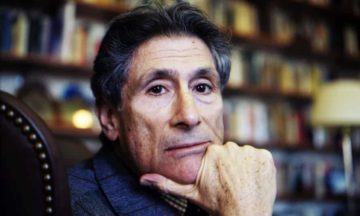Ahdaf Soueif in The Guardian:
 Long after his death in 2003, Edward W Said remains a partner in many imaginary conversations.” The opening line of Tim Brennan’s biography of Said is true – it’s hard to come up with another thinker who remains so present in his absence. Some 50 or so books have been written about him. His writings are taught in universities across the world. Look on social media and you’ll find him constantly referred to, in easy, familiar terms, by the young across the globe. His portrait is on the walls of the old cities of Palestine, in the company of the martyrs. The events of the past years, not least the Arab uprisings and the counter-revolutionary triumphs that followed them, have been for many of us occasions where we turned to his ideas and his example.
Long after his death in 2003, Edward W Said remains a partner in many imaginary conversations.” The opening line of Tim Brennan’s biography of Said is true – it’s hard to come up with another thinker who remains so present in his absence. Some 50 or so books have been written about him. His writings are taught in universities across the world. Look on social media and you’ll find him constantly referred to, in easy, familiar terms, by the young across the globe. His portrait is on the walls of the old cities of Palestine, in the company of the martyrs. The events of the past years, not least the Arab uprisings and the counter-revolutionary triumphs that followed them, have been for many of us occasions where we turned to his ideas and his example.
Said bestrode not just one world, but several. Just as he was at the same moment a New Yorker and a Palestinian brought up in Egypt, he was also a literary critic, a theorist, a political activist, a musician and more. And if this led to him being “not quite right” in any one world, his genius was to transmute this condition into the engine of ideas around which a considerable part of the intellectual and political life of these worlds came to revolve.
Brennan was Said’s student and friend, familiar with his ideas and comfortable in his company. For Places of Mind he worked closely with Said’s family, conducted interviews with a wide range of his friends and colleagues and (he must have) thoroughly mined the archive held in Columbia University, where Said taught for his entire career. (One delightful moment in the book is when Brennan finds that Said’s teaching notes from 1964 to 1984 prove his old teacher’s statement that some of his best ideas came from his teaching.)
More here.
